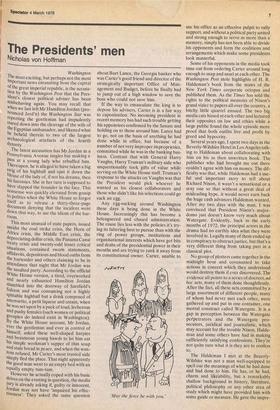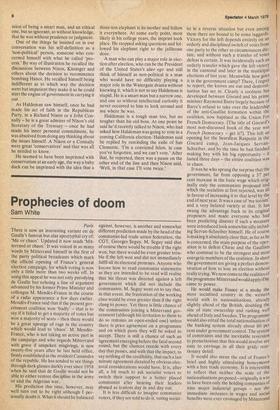The Presidents' men
Nicholas von Hoffman
Washington The most exciting, but perhaps not the most important news emanating from the capital of the great imperial republic, is the accusation by the Washington Post that the President's closest political adviser has been misbehaving again. You may recall that When we last left Mr Hamilton Jordan (pronounced Jerd'n) the Washington Star was reporting the gentleman had impudently stared down into the cleavage of the wife of the Egyptian ambassador, and likened what he beheld therein to two of the largest archaeological artefacts of the fourth dynasty. The latest accusation has Mr Jordan in a Pennsylvania Avenue singles bar making a Pass at a young lady who rebuffed him. Thereupon, he is alleged to have taken a big swig of his highball and spat it down the blouse of the lady of, if not his dreams, then his fantasies. She in her turn is supposed to have slapped the bounder in the face. This nonsense was quickly elevated from gossip to politics when the White House so forgot itself as to release a thirty-three-page document denying that the incident went down that way, to use the idiom of the barroom.
This most unusual of state papers, issued amidst the coal strike crisis, the Horn of Africa crisis, the Middle East crisis, the depreciating dollar crisis, the Panama Canal treaty crisis and twenty-odd lesser critical
situations, contained sworn statements, affidavits, depositions and blood oaths from the bartender and others claiming to be in attendance that night that Mr Jordan was the insulted party. According to the official White House version, a tired, overworked and nearly exhausted Hamilton Jordan stumbled into the doorway of Sarsfield's Saloon and was consuming not a highly sPittable highball but a drink composed of amoroetto, a petit liqueur and cream, when he was set upon by a pack of loud, lecherous and pushy females (such women or political groupies do indeed exist in Washington). Ey the White House account, Mr Jordan, ever the gentleman and ever in control of himself, asked these well-shaped harpies and beauteous young bawds to let him eat his simple worlcman's supper of thin soup and stale bread in peace, and when the wantons refused, Mr Carter's most trusted aide simply fled the place. That night apparently the good man went to an empty bed with an equally empty tum-tum.
However he actually coped with his basic drives on the evening in question, the media Jury is already asking if, guilty or innocent, Jordan may not have 'impaired his effectiveness'. They asked the same question about Burt Lance, the Georgia banker who was Carter's good friend and director of the strategically important Office of Management and Budget, before he finally had to jump out of a high window to save the boss who could not save him.
If the way to emasculate the king is to depose his advisers, Carter is in a fair way to caponisation. No incoming president in recent memory has had such trouble getting his appointees confirmed by the Senate and holding on to those around him. Lance had to go, not on the basis of anything he had done while in office, but because of a number of not very improper improprieties, committed while he was in the banking business. Contrast that with General Harry Vaughn, Harry Truman's military aide who unquestionably took gifts of value while serving on the White House staff. Truman's response to the attacks on Vaughn was that the President would pick whoever he wanted as his closest collaborators and those who didn't like his selections could go suck an egg.
Any egg-sucking around Washington these days is being done in the White House. Increasingly this has become a beleaguered and chased administration. The cause lies less with the policies it's trying its faltering best to pursue than with the ring of power groups, institutions and organisational interests which have got bits and drabs of the presidential power in their mouths and are trying to yank it away from its constitutional owner. Carter, unable to use his office as an effective pulpit to rally support, and without a political party united and strong enough to serve as more than a memory, simply has not been able to divide his opponents and form the coalitions and arrangements which make some presidents look masterful.
Some of his opponents in the media took time out from ordering Carter around long enough to snap and snarl at each other. The Washington Post stole highlights of H. R. Haldeman's book from the maws of the New York Times corporate octopus and published them. As the Times has sold the rights to the political memoirs of Nixon's grand vizier to papers all over the country, a bitchy little quarrel ensued. The two big media cats hissed at each other and lectured their opposites on law and ethics while a large public found the whole episode more proof that both outfits live and profit by greed and hypocrisy.
Several years ago, I spent two days in the Beverly-Wilshire Hotel in Los Angeles talking to Haldeman about collaborating with him on his as then unwritten book. The publisher who had brought me out there couldn't agree with him on money. The difficulty was that, while Haldeman had a useful and important story to tell about Richard Nixon, it wasn't a sensational or a sexy one so that without a great deal of misleading hype, it would never earn back the huge cash advances Haldeman wanted. After my two days with the man, I was convinced that President Nixon's majordomo just doesn't know very much about Watergate. Evidently, back in the early months of 1972, the principal actors in the drama had no earthly idea what they were involved in. Legally many of them ended up in conspiracy to obstruct justice, but that's a very different thing from taking part in a classical plot.
No group of plotters came together in the midnight hour and covenanted to take actions in concert which they understood would destroy them if ever discovered. The evidence all points to a series of discreet, ad hoc acts, many of them done thoughtlessly. After the fact, all these acts committed by a large assortment of different people, many of whom had never met each other, were gathered up and put in one container, one mental construct called Watergate. It is a gap in perception between the Watergate perpetrators and the Watergate prosecutors, juridical and journalistic, which may account for the trouble Nixon, Haldeman and some others have had in making sufficiently satisfying confessions. They're not quite sure what it is they are to confess to.
The Haldeman I met at the BeyerlyWilshire was not a man well-equipped to spell out the meanings of what he had done and had done to him. He has, or he had, charm and likeability, but a remarkably shallow background in history, literature, political philosophy or any other area of study which might have provided him with some guide or measure. He gave the im pre ssion of being a smart man, and an ethical one, but so ignorant, so without knowledge, that he was without prudence or judgment.
One of the things he insisted on in our conversation was his self-definition as a `non-political' person, someone who concerned himself with what he called `process.' By way of illustration he recalled the discussions between Nixon, Kissinger and others about the decision to recommence bombing Hanoi. He recalled himself being indifferent as to which way the decision went but impatient they make it so he could start the engine of government in carrying it out.
As Haldeman saw himself, once he had made his act of faith in the Republican Party, in a Richard Nixon or a John Connally — he is a great admirer of Nixon's old Secretary of the Treasury — once he had made his inner personal commitment, he was absolved from doing any thinking about the issues himself. A Nixon or a Connally were great `conservatives' and that was all he needed to know.
He seemed to have been imprinted with conservatism at an early age, the way a baby duck can be imprinted with the idea that a three-ton elephant is its mother and follow it everywhere. At some early point, most likely in his college years, the imprint took place. He stopped asking questions and followed his elephant right to the jailhouse door.
A man who can play a major role in election after election, who can be the President of the United States's alter ego and still think of himself as non-political is a man who would have no difficulty playing a major role in the Watergate drama without knowing it, which is not to say Haldeman is stupid. He is a smart man but a narrow one, and one so without intellectual curiosity it never occurred to him to look around and see where he was.
Haldeman is a tough man too, but no tougher than his old boss. At one point he said he'd recently talked to Nixon, who had asked how Haldeman was going to vote in a coming California election. Haldeman said he replied by reminding the exile of San Clemente, `I'm a convicted felon, in case you've forgotten, and we can't vote.' After that, he reported, there was a pause on the other end of the line and then Nixon said, `Well, in that case I'll vote twice.'



































 Previous page
Previous page